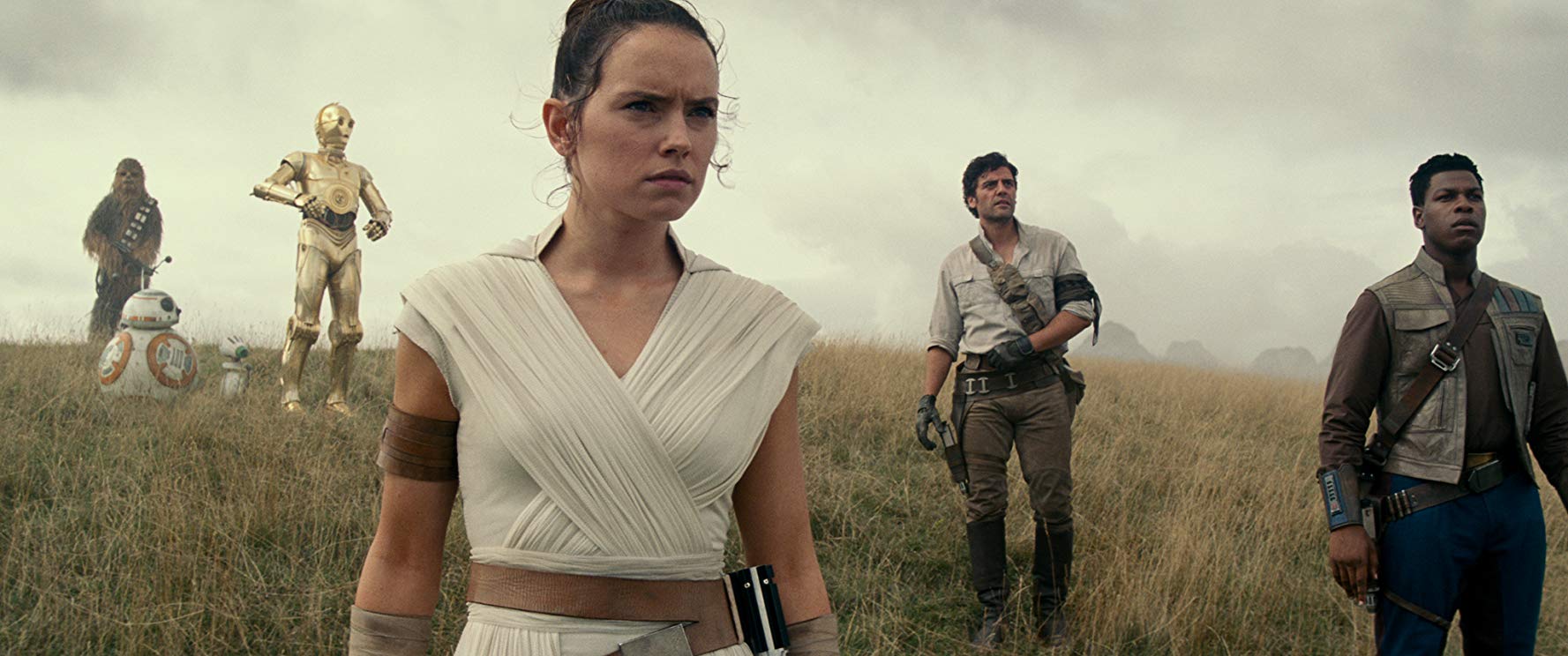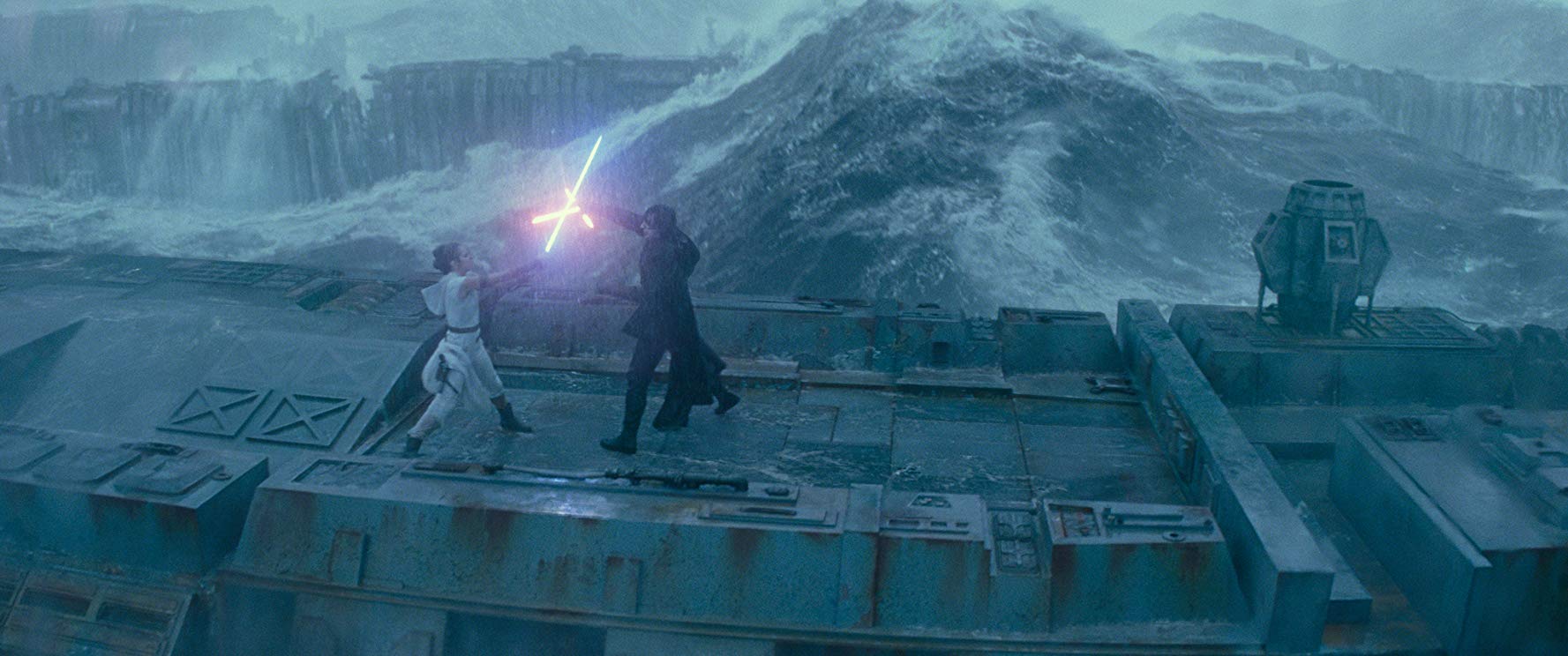As the culmination of what George Lucas began four decades prior, Star Wars: The Rise of Skywalker needs to conclude the Skywalker Saga and directly follow this franchise’s most daring entry, The Last Jedi. That film’s director, Rian Johnson, boldly argued we should not be telling the same tale over and over again, but forge ahead with new ideas, stories, and characters for a more promising, fruitful future. His narrative principles were in direct conflict with the Disney ethos that more of the same will yield more lucrative results. With noted disappointment and little surprise, J.J. Abrams’ finale doesn’t just directly refute many of the ideas of its predecessor–its brand of nostalgia also feels more brazenly pandering than heartfelt.
For as simple as the opening crawl is–Palpatine has returned, Kylo Ren wants to take him down, and Rey is training to fight the First Order–The Rise of Skywalker‘s first half proves needlessly convoluted. With no shortage of MacGuffins, most of which have some aural or visual flashback attached, much of the film is concerned with prodding Rey with the notion that there are secrets in her past she must discover. A direct contradiction to Johnson’s repeated mantra of letting old things die, this ninth and final film in the series is wholly about the desire to uncover the past to unlock one’s true identity and honor the generations and iconic characters that came before–an approach so congruous with The Force Awakens that if The Last Jedi was mysteriously scrubbed from Star Wars canon, this trilogy could become a two-fer with very little narrative disarray.

If the undoing of pathos that previously drove our protagonists weren’t enough, the sheer disregard for the foundations that were set up becomes apparent in other ways: a substantial franchise presence flat-out says “I was wrong” about what came before, and Kelly Marie Tran’s Rose Tico is more or less a background character. In terms of the rest of the ensemble, Richard E. Grant enjoys his brief, villainous role as Allegiant General Pryde and Oscar Isaac’s Poe Dameron is having the most fun, going even further in his Solo-meets-Indiana Jones persona of a roguish-yet-loyal adventurer alongside John Boyega’s Finn and Joonas Suotamo as Chewie. Rey (Daisy Ridley) and Kylo Ren’s (Adam Driver) ying-yang bond reaches a logical conclusion, both actors doing their best with material that is far less compelling than their prior outing. And though Carrie Fisher’s return as Leia is created from unused footage shot for prior films, it’s remarkable how well her heartfelt turn works. (Nevertheless, certain use of CGI in another scene shows how much further we must go to leap out of the uncanny valley.)
Considering its unassailable ties to the entire franchise, it’s nearly impossible to evaluate The Rise of Skywalker purely on its own merits; on a strict level of directorial capability, however, Abrams continuously seems to be scrambling to inject energy into a story lacking imagination. There’s a similar bag of workmanlike tricks from the sturdily entertaining if conceptually safe The Force Awakens: epic push-ins as characters are re-introduced, a camera constantly in motion as if fearful that one moment of stillness might translate to evaporating audience attention. That frenzied energy, especially in the first hour, is also attributable to Abrams and Chris Terrio’s script, which is three-fourths time-wasting, planet-hopping adventures, one-fourth the narrative backing itself into a narrow corner of predictable outcomes. There exist the briefest hints of queer representation and the human toll caused by a fascist regime; they’re subsequently ignored to provide crowd-pleasing moments engineered for maximum emotions that end up forced and empty.

Environments are culled from what is no doubt gorgeous, creatively rendered concept art as is customary for the series. There are lightsaber fights in-between tsunami-sized waves, high-speed quarrels with a new kind of Stormtrooper across the desert, and galactic battles of epic proportions. The scale of these conflicts is felt; the weight, on both tactile and emotional levels, is not. Disney has made sure nobody (or thing) ever truly stays dead, and that cheap trick is certainly doled out here–but Abrams goes a step further to loosen the suspense. It’s not just characters from past films brought back, but mere moments after a climactic sense of loss, there’s reassurance that everything will be okay. It’s the kind of warm coddling warranted for something like the Paddington franchise, not a script with constant conjecture about life-or-death stakes and a fantastical world filled with endless possibilities.
Forty-two years after Star Wars changed the landscape of blockbusters, we’re in a world where such large-scale filmmaking is increasingly paint-by-committee. If anything, The Rise of Skywalker will leave some thinking they took Rian Johnson’s outing for granted, and might have unfairly maligned prequels where at least a single creative voice was guiding the decisions, however strange they were. J.J. Abrams’ saga-capper poses the question: when all is said and done, is it more satisfying to simply witness a single, fleeting glance of something you previously enjoyed, or would you rather experience adventurous storytelling with complex characters? If The Force Awakens tipped its scales to the former, it at least had a coherent sense of fun as we met faces new and old. By lacking a sense of vision in embracing what came before and ignoring the recently laid path for where this story could go, The Rise of Skywalker is not only a disappointing end to this saga–it’s also an ill-fated harbinger for Disney’s future in storytelling.
Star Wars: The Rise of Skywalker opens on Friday, December 20.
